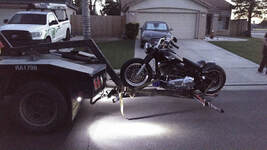Towing Service Bakersfield CA
24-Hour Flat Tire Service | Cheap Towing in Bakersfield CA

This is the second part of our discussion that focuses on your vehicle's tires. Below's excerpt is about how to pick out the correct tires and we touched a little bit on how to maintain them. Since that is a much longer topic. We will finish that interesting conversation on the next blog post. Again our source for this valuable information is the bookDare to Repair Your Car, A Do-It-Herself Guide to Maintenance, Safety, Minor Fix-its, and Talking Shop (1st ed, copyright 2005) by Julie Sussman & Stephanie Glakas-Tenet. Call our towing company in Bakersfield if you need more comprehensive information.
Where Can You Purchase Tires?
A tire store will offer the widest choice of brands and sales; discount clubs (like Costco) offer fewer brand choices, but the prices are usually lower and constant; car dealerships can be expensive; and buying online may be cheap, but the hassle of trying to locate a mechanic who will mount the tires and then schlepping the tires to his shop may not be worth it.
If you can only afford to buy from a used-tire store, be sure to test the tread on the tire, as well as to check the date it was manufactured. Some of the used tires are actually spare tires that may have good treadwear, but they also may be quite old. Any tire that is 6 years or older is not worth buying for safety reasons.
Warranties
Some vehicle manufacturers warranty tires that are sold with new cars as well as replacement tires sold through some car dealerships. And some tire dealers provide a warranty (aka. tire protection plan) if there is a problem with a tire that's not for general use – such as for trailers, RVs, and so on – and offer a warranty that will cover tire cuts and sidewall damage, flat repairs, lifetime wheel balancing, and tire rotation. So, before buying tires, shop around for the best price and warranty package.
Some warranties are prorated according to tread depth. Therefore, if there’s a problem early in the life of the tire, the warranty may cover it.
When you purchase new tires, ask for the manufacturer’s registration card. It's worth filling out because in case of a recall of the tires, the manufacturer will be able to contact you.
But wait, there's more!
Additional Costs
So you've found the right tires for your car and the price is reasonable. But before you pay, you need to ask about the extra cost of mounting, balancing, valves, stems, and aligning – and if you're just replacing one or two tires, then you also need to figure in the cost of rotation. Plus, there's normally a fee for used-tire disposal and possibly a state environmental fee. Ask the mechanic to add up all the line items and see if it's still affordable. If not, you may need to choose a comparable tire at a lower price. Just be aware that lower-priced tires can equate to handling and noise issues.
Tire Maintenance
Maintaining your car's tires is vital to your safety on the road. And we're not inflating its importance one bit.
Maintaining a Tire’s Air Pressure
What if we told you that there is one simple thing you could do to increase your car's gas mileage, help the environment, prevent accidents, and extend the life of your tires – and it only takes about 10 minutes to do? Curious? It's keeping your tires properly inflated. This is probably the quickest and easiest maintenance you can do on your car, but would you believe that most people don't have properly inflated tires?
Notice we used the term "properly inflated" – that's because both under- and overinflated tires can be hazardous. Underinflated tires wear out more quickly, negatively affect the way the car handles, and increase fuel consumption. If your tires squeal when you turn a corner, it could be a sign of underinflated tires. Overinflated tires create harsher ride, bad handling, and can be damaged easily from potholes. With all the benefits of keeping your tires properly inflated, it's just a no-brainer to do this weekly and absolutely before any long trips.
PSI
How do you know how much air your tires need? The unit of measurement for air in tires is psi (pounds per square inch). Okay, that's as scientific as we're going to get. Most passenger car tires have anywhere from 26 to 42 psi. To find out the psi for your tires, look for the vehicle's certification tire label located inside the driver's doorjamb, glove compartment, or fuel filler door; or you may find more information in the owner's manual. You may think that the information is on the sidewall of the tire, but the psi listed on the tire is the maximum pressure. An easier way to understand this is that the tire is designed to carry a vehicle and the psi is what carries the load.
For some cars, the psi for the front tires may be different than the psi for the back tires. Refer to the car owner's manual for correct inflation pressures.
Another important thing to know about the psi rating is that it is based only on a “cold” reading. Huh? Okay, a little more science. Driving your car causes the air in the tire to heat up and expand. Therefore, if you test the air in your tires after you've been driving around, you will get a higher psi reading than if the tires were cold. That's part of the reason why so many people drive around with underinflated tires."
